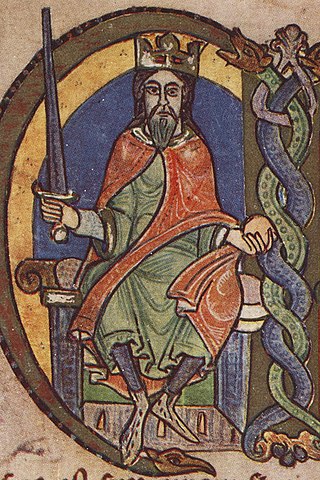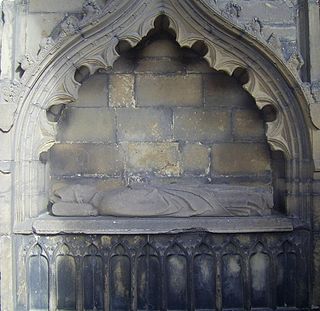Related Research Articles
Robert Baillie was a Church of Scotland minister who became famous as an author and a propagandist for the Covenanters.

David I or Dauíd mac Maíl Choluim was a 12th-century ruler who was Prince of the Cumbrians from 1113 to 1124 and later King of Scotland from 1124 to 1153. The youngest son of Malcolm III and Margaret of Wessex, David spent most of his childhood in Scotland, but was exiled to England temporarily in 1093. Perhaps after 1100, he became a dependent at the court of King Henry I of England. There he was influenced by the Norman-French culture of the court.
William Turnbull was a Scottish politician and bishop, credited with founding Jedburgh Grammar School and the University of Glasgow. He served as the Bishop of Glasgow, from 1448 to 1454 and was the first Chancellor of the University of Glasgow.
Andreas de Moravia was a 13th-century Scottish bishop. He was a younger son of Hugh de Moravia, from the family of Flemish origin who were lords of Duffus and other areas in the Greater Moray region in this period. In the time of Bishop Bricius' episcopate (1203–1222), there was a man called "Andreas" who was rector of the church of St. Peter at Duffus, and this may well have been this Andreas. He may also have been a native Scot.
Jocelin was a twelfth-century Cistercian monk and cleric who became the fourth Abbot of Melrose before becoming Bishop of Glasgow, Scotland. He was probably born in the 1130s, and in his teenage years became a monk of Melrose Abbey. He rose in the service of Abbot Waltheof, and by the time of the short abbacy of Waltheof's successor Abbot William, Jocelin had become prior. Then in 1170 Jocelin himself became abbot, a position he held for four years. Jocelin was responsible for promoting the cult of the emerging Saint Waltheof, and in this had the support of Enguerrand, Bishop of Glasgow.
Enguerrand was a twelfth-century bishop of Glasgow. He had previously been Archdeacon of Teviotdale, and had served king Máel Coluim IV as Chancellor of Scotland between 1161 and 1164. He was elected Bishop of Glasgow on Sunday, 20 September 1164, and consecrated on 28 October at the hands of Pope Alexander III himself in Sens, France, where the Pope was then resident. He did not return to the diocese until 2 June 1165. Although he resigned the position of Royal Chancellor upon election to the bishopric, there is charter evidence that he once again became Chancellor in the reign of King William the Lion, probably in the year 1171. Notable actions of his episcopate included, probably on the request of his friend Jocelin, then Abbot of Melrose, the opening of the tomb of the emerging saint Walthoef. He died on 2 February 1174.

William de Lawedre was Bishop of Glasgow and Lord Chancellor of Scotland.
Robert Blackadder was a medieval Scottish cleric, diplomat and politician, who was abbot of Melrose, bishop-elect of Aberdeen and bishop of Glasgow; when the last was elevated to archiepiscopal status in 1492, he became the first ever archbishop of Glasgow. Archbishop Robert Blackadder died on 28 July 1508, while en route to Jerusalem on pilgrimage.
Hugh or Hugo de Sigillo was 13th century bishop of Dunkeld, Atholl, Scotland. Little is known of his general background before becoming bishop. What is known in that he was a clerk of King William of Scotland and Abbot of Newbattle. Hugh succeeded John de Leicester as bishop on 5 October 1214. He was a frequent witness to royal charters in the period. The date of his consecration is not known. On 29 September 1226 he gave benediction to Radulf II, Abbot of Melrose. He died sometime in 1229.

Robert Boyd of Trochrig (1578–1627) was a Scottish theological writer, teacher and poet. He studied at the University of Edinburgh and after attending lectures by Robert Rollock, prosecuted his studies in France, and became a minister in the French Church. All accounts represent him as a most accomplished scholar. A friend said of him, with perhaps some exaggeration, that he was more eloquent in French than in his native tongue; and Livingstone tells us that he spoke Latin with perfect fluency, but that he had heard him say, if he had his choice, he would rather express himself in Greek than in any other language. The Church of Boyd's adoption, which had given Andrew Melville a chair in one university, and Sharp a chair in another, was not slow to do honour to their brilliant countryman. He was made a professor in the protestant Academy of Saumur; and there for some years he taught theology. He was persuaded, however, in 1614 to come home and accept the Principalship of the Glasgow University. Though he was far from extreme in his Presbyterianism, he was found to be less tractable than the king and his advisers expected, and was obliged to resign his office. But he was long enough in Glasgow to leave the impress of himself on some of the young men destined to distinction in the Church in after years.
Lewis de Beaumont was Bishop of Durham during the last half of the First War of Scottish Independence.

John de Winchester was a 15th-century English cleric who distinguished himself as an administrator and bishop in Scotland. Winchester was a student of canon law from 1418, graduating with a bachelorate in 1421.
Alexander Gordon was a late medieval Scottish churchman. He was member of the kindred of the Earl of Huntly, being cousin to the reigning earl. He was the third son of James Gordon, Laird of Haddo.
Robert Forman was a late medieval Scottish churchman. He was the son of one Janet Blackadder and her husband, a Berwickshire landowner named Nicholas Forman of Hatton. Sometime before 11 February 1500, he was made Precentor of Glasgow. He was Dean of Glasgow from 1505, a position he would hold until his death. Between 1506 and 1511 he was also in possession of the Chancellorship of the diocese of Moray.
Henry Wemyss was a prelate from the 16th century Kingdom of Scotland. He appears in the sources in the bishopric of Galloway for the first time in 1517, and rose to become Bishop of Galloway in 1526, a position he held until his death in 1541.
Reinald Macer [also called Reginald] was a medieval Cistercian monk and bishop, active in the Kingdom of Scotland during the reign of William the Lion. Originally a monk of Melrose Abbey, he rose to become Bishop of Ross in 1195, and held this position until his death in 1213. He is given the nickname Macer in Roger of Howden's Chronica, a French word that meant "skinny".
Robert Capellanus, was a chaplain of King William I of Scotland and afterwards, Bishop of Ross (1214–1249).
Laurence de Ergadia was a thirteenth-century Scottish bishop. Probably from the MacDougall kindred of Argyll, Laurence had become a Dominican friar and presumably university graduate before being elected Bishop of Argyll, an election which took place sometime between 1262 and 1264. Although the election was quashed by the Pope in 1264, the Pope gave him a fresh provision to the bishopric. Laurence appears intermittently in the records during his three and a half decade episcopate, but his activities in his own diocese are badly recorded. He died as Bishop of Argyll sometime in either 1299 or 1300.

Covenanters were members of a 17th-century Scottish religious and political movement, who supported a Presbyterian Church of Scotland and the primacy of its leaders in religious affairs. The name is derived from covenant, a biblical term for a bond or agreement with God.

John Livingstone was a Scottish minister. He was the son of William Livingstone, minister of Kilsyth, and afterwards of Lanark, said to be a descendant of the fifth Lord Livingston. His mother was Agnes, daughter of Alexander Livingston, portioner, Falkirk, brother of the Laird of Belstane.
References
- ↑ McClintock, John; Strong, James (1887). Cyclopaedia of Biblical, Theological, and Ecclesiastical Literature (volume II (CO-Z) ed.). New York: Harper. p. 807. Retrieved 22 July 2017.
- Anderson, Alan Orr, Early Sources of Scottish History: AD 500–1286, 2 Vols, (Edinburgh, 1922), vol. ii, p. 305
- Dowden, John, The Bishops of Scotland, ed. J. Maitland Thomson, (Glasgow, 1912), pp. 299–300